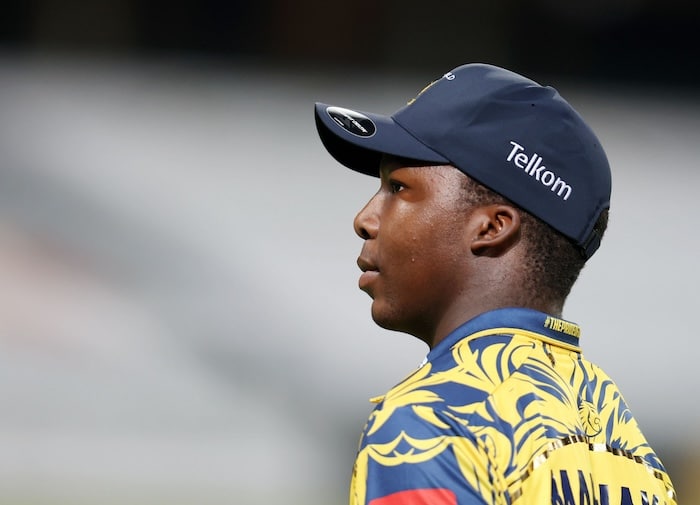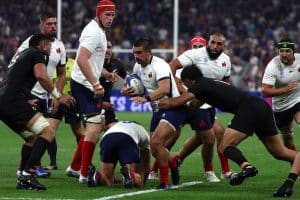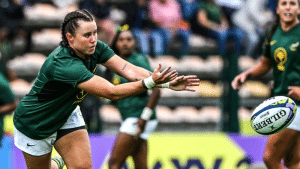Kwena Maphaka is South Africa’s new fast bowling hope and there is plenty of reason to believe the hype around the 18-year-old, writes Firdose Moonda.
Kwena Maphaka, the 18-year-old left-arm seamer from St Stithians College, had one big sporting goal for 2024 and it didn’t involve cricket.
Maphaka’s aim was to get selected for the Southern Gauteng under-18 A hockey team as he figured that with a cricket career beckoning, this would be his last opportunity to reach the highest level he could in one of his other sports.
With winter just beginning, he still has time to get there, but even if he does, it won’t be his biggest sporting achievement this year.
That came in January, when Maphaka was named player of the tournament at the Under-19 World Cup, where he took 21 wickets in six matches, including three five-fors, to bowl South Africa to the semifinal.
It was his second age-group World Cup and the perfect stage to show SA’s fastbowling pipeline just keeps delivering.
Two years earlier, a 16-year old Maphaka was included in the squad that played in West Indies, where he was quick for his age but something of a wild child when it came to control.
He played three matches and took seven wickets at a decent average of 18.28 but then returned home to work on consistency in length and returned as a model of maturity and menace.
Now, Maphaka generates late inswing, has a mean bouncer and accurate yorker and is a quintessential quick who is feared every time he has ball in hand.
He finished the 2024 event with an eye-popping average of 9.71 and conceded 3.81 runs to the over to finish as the player with the joint-most wickets in Under-19 World Cup history: 28.
It took just a month before he made his provincial debut for the Lions in the CSA T20 Challenge, a competition he played in while also juggling all the demands of being in matric.
Because this is Maphaka’s final year of school, and he needed time to concentrate on his studies, the Lions agreed to use him for home games only, with the exception of one trip to Potchefstroom. His debut season was going well, with seven wickets from four games.
Then the IPL came calling. Maphaka was initially set to travel to India during the Easter holidays and work in the nets with Rajasthan Royals as part of his deal with the SA20’s Paarl Royals franchise. But when Sri Lanka’s Dilshan Madushanka was ruled out of Mumbai Indians’ (MI) squad with injury, a more serious offer emerged and Maphaka had to leave the books behind. Sort of.
He would be a squad member for MI and happily, Rassie van der Dussen’s wife Lara, a schoolteacher, agreed to travel to India for segments of the tournament to tutor him.
And so his Indian adventure began. On March 27, Maphaka started against a Sunrisers Hyderabad team stacked with big hitters. He opened the bowling and his first over went for a fairly respectable seven runs.
He then changed ends and was hit for 21 in his second over as ODI World Cup winner Travis Head got hold of him.
By the end of his four overs, Maphaka had also been smashed by Heinrich Klaasen, Aiden Markram and Abhishek Sharma and had conceded 66 runs – the fifthmost expensive figures in IPL history.
Although he wasn’t the only bowler who suffered while Sunrisers posted the highest total in an IPL game, he was the youngest to be taken apart in such merciless fashion.
South African great Dale Steyn called the game a “baptism of fire” for Maphaka, as he realised the difference “between u19 and pro league” on X (formerly known as Twitter), but others were more compassionate in the aftermath.
Commentator Ian Bishop, who had been at the Under-19 World Cup, asked people to “Remember he is 17 years old,” and that, “with the right people around him, this experience, taken in the right way, should make him stronger.”
Dwayne Bravo posted an Instagram image and encouragement for Maphaka: ”keep your head up Champ!” He also had words of advice: “Don’t let this one-off game make you start to doubt yourself, it’s a great challenge for you and you will only get better as the tournament goes on!”
Bravo was partly right. Maphaka played one more match, four days later, and enjoyed a better return of 1 for 23 in two overs.
His wicket was Indian international Yashasvi Jaiswal, but that was not enough to be given more game time in this edition of the tournament.
There’s no doubt that will change in the years to come. Maphaka has already attracted interest from the Caribbean Premier League, America’s Major League Cricket and England’s Hundred, but is expected to continue putting school first.
He even harbours some hopes of pursuing a qualification in sports management or clinical psychology, but could find himself a little too busy for any of that.
The Lions are keen to use him across all formats next summer and Maphaka is especially interested in playing red-ball cricket, which will please the traditionalists, particularly South Africa’s Test coach Shukri Conrad.
It will help that Maphaka and Conrad have a prior relationship from their time together at the 2022 Under-19 World Cup, and Conrad will understand the management a player like Maphaka will require to ensure the longevity of his career.
In the more immediate term, whiteball coach Rob Walter can be expected to look for opportunities for Maphaka, and slightly further ahead, the 2027 home ODI World Cup will be an event earmarked for him.
The romantics will imagine an opening bowling pair of Maphaka and his hero Kagiso Rabada, both from the same school, on the world’s biggest stage. By then, Rabada will be 31 and perhaps nearing the twilight of a glittering international career.
Maphaka will be 21, his hockey days behind him and his best still to come. It’s the stuff sporting dreams are made of, and everything suggests it could come true. Stay tuned.





